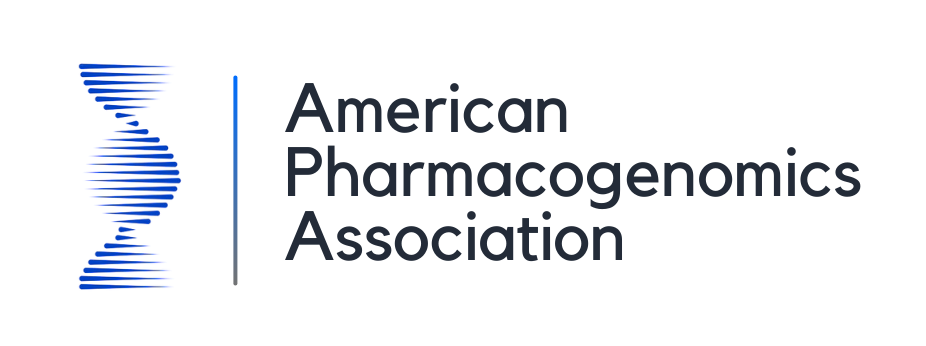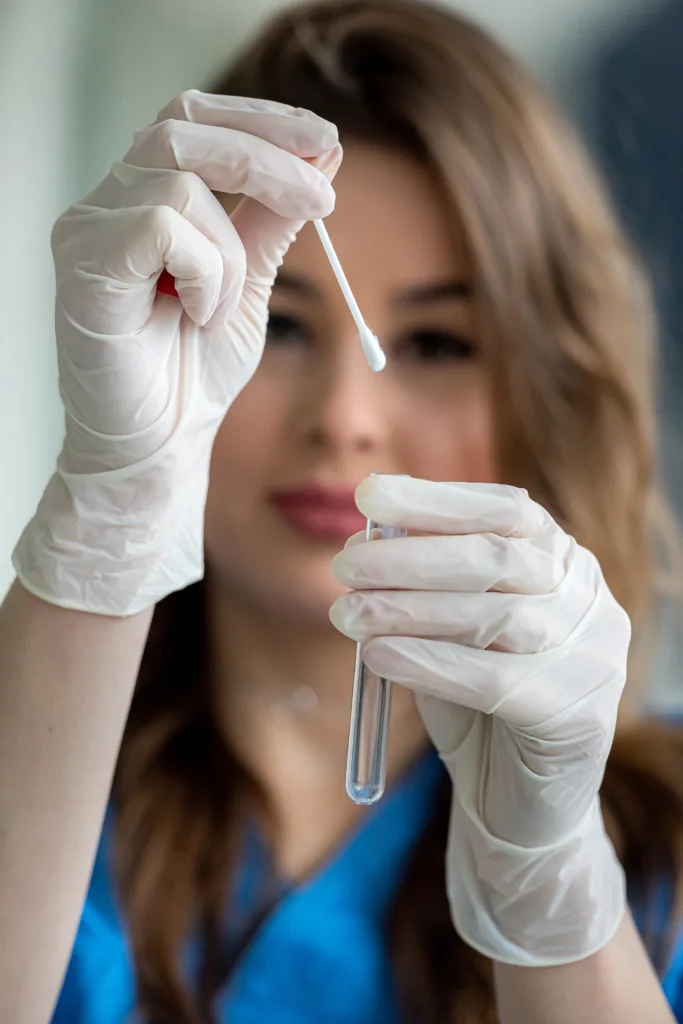Get the Right Meds for YOU: DNA Medication Screening
DNA swab test to see how your genes affect how your body processes medications.

The American Pharmacogenomics Association (APGxA) is excited to bring you Get the Right Meds for YOU: DNA Medication Screening, a mobile screening initiative visiting 9 select cities across the United States over the next 12 months!
We are inviting you to participate in a simple preventative health screening to assess your risk for adverse drug interactions. The pharmacogenomics (PGx) test may help you and your doctor find medications that work better for you. Drug interactions are the fourth leading cause of death in the United States. Uncover a lifetime of better medication management for just $399 (MSRP of $699) with a one-time PGx test.


Our “Get the Right Meds for YOU: DNA Medication Screening” program is partnering with Plexus DX, a leader in PGx testing, to analyze your genes and see how your body metabolizes medications. This personalized information can help you and your doctor choose the most effective medications and potentially avoid side effects.
The Testing Process
This innovative program offers a simple DNA swab test to unlock the secrets of pharmacogenomics (PGx). PGx analyzes your genes to see how your body processes medications. Conducted by the American Pharmacogenomics Association.
- Consultation: Education will be presented by a PGx professional.
- Sample Collection: A healthcare professional will typically perform a quick and painless cheek swab to collect a small sample of cells.
- Sample Processing: The swab is sent to a laboratory for analysis.
- Genetic Analysis: In the lab, your DNA is extracted from the cheek cells. Specific genes related to drug metabolism are then analyzed.
- Results and Interpretation: The lab analyzes the genetic data and generates a report for you that can be shared with your doctor. The report will explain how your genes might affect your body’s ability to process certain medications.
Timeline: The actual cheek swab collection takes only a minute or two. However, it can take a few days to a couple of weeks to receive your results from the lab after they receive your sample.

With PGx information, you and your doctor can work together to:
Increase Medication Effectiveness:
Medications might work better for you if they are compatible with your genetic makeup.
Reduce Side Effects:
The test can help identify individuals who are more likely to experience unpleasant or even dangerous side effects from certain medications, allowing doctors to choose alternatives.
Improve Overall Health Outcomes:
Personalized medicine approaches, informed by PGx testing, can lead to better medication management and potentially improved health outcomes.
Contact Us
By signing up over on the little form to your right, we will keep you updated about new city stops.
The American Pharmacogenomics Association is bringing PGx testing to cities all across the United States. Join us for this life saving test!
Community Testing Mailing List
Don’t Miss Out!
Get Your Personalized Health Insights with Our One-Day PGx Testing in These Select Cities
Transforming Lives Through PGx Testing: Hear What Others Say
Who should get tested?
Anyone who takes medications can benefit from PGx testing. It’s especially valuable for those who:
- Experience side effects from medications.
- Haven’t found medications that work well for them.
- Take multiple medications.
What do the reports show?
PGx reports don’t make decisions for you. Instead, they provide unprecedented insight into your unique genetic make-up to assist your clinician in developing true, personalized care.
How do the reports work?
Your DNA contains variants, or SNPs (single nucleotide polymorphisms) that may signal potential benefits and risks that lie within your DNA. Our reports examine the complex interplay between these variants and how they can affect your quality of life.
What do the reports include?
We include evidence-based, well-researched potential intervention strategies that will serve as a basis of discussion between you and your doctor.
What are intervention strategies?
Intervention strategies can include encompassing environment, lifestyle, nutrition, supplements and medications for a theme of discussion.
Who needs to be screened?

You do. PGx testing analyzes your genes to see how your body processes medications. This can help your doctor choose the right medication and dosage for you, potentially reducing side effects, avoiding ineffective medications, and streamlining the process of finding the best treatment. By understanding your unique genetic makeup, PGx testing contributes to a more personalized approach to medicine, leading to safer and more effective medication use.
Which screenings will be performed?

A PGx test involves a quick and painless cheek swab to collect your DNA. This DNA is analyzed to see how your genes affect how your body processes medications. The results, typically received in a few weeks, can then be used by your doctor to personalize your medication plan for potentially better treatment and fewer side effects.
How long does it take?

At the top of each hour we will do a 15-20 minute education about PGx and how it works. Then, patients for that hour will have the test done. The PGx test itself takes very little time. The actual cheek swab collection is a quick and painless procedure, usually lasting only a minute or two.
However, the time it takes to receive your results depends on the lab processing the test. It typically takes a few days to a couple of weeks to get your PGx test results back from the lab after they receive your sample.
Will insurance cover these screenings?

Though your doctor may order preventative screenings, frequently insurance providers do not cover them unless you are showing symptoms. Unfortunately more than 80% of people who suffer drug interactions show no symptoms or warnings. That’s why the American Pharmacogenomics Association helps to bridge this gap by offering community-based screenings at an affordable price.
Can’t my doctor do these screenings?

While many doctors are becoming familiar with PGx testing, there are reasons why you might choose independent community testing. Doctor awareness and insurance coverage can vary. PGx tests are not available for all medications yet, and integrating results into existing workflows can take time. Independent community testing empowers you to take a proactive approach to your health by offering convenient access to PGx testing and potentially faster results.
How often does this need to be done?

In most cases, you’ll only ever need one PGx test in your lifetime. The genes analyzed are stable and the information applies to most medications you might take. However, if a completely new medication relevant to your PGx results is developed, or if there are major advancements in the field uncovering new gene-drug interactions, a follow-up test might be recommended in rare situations.
What is the minimum age for screening?

While there’s no set minimum age for a PGx test, waiting until around 12 is generally recommended. This ensures the child’s DNA profile is mature and they might be on medications where PGx results are relevant. Additionally, understanding the test results is important, which is easier for older children or adults. Ultimately, consult a doctor to decide if and when a PGx test is right for your child, considering their specific circumstances and medication needs.
Can I bring along a friend or spouse?

Absolutely. However, if they are interested in testing, pre-registration is required.
What is the cost?

The cost per test is $399 (MSRP of $699) per person. Again, this test is good for your lifetime!
- The PGx test is indicated for use in people 12 years old or older.
- The PGx test, as with all genomic testing, has limitations. Patients should always discuss the test with a healthcare provider knowledgeable about the test to see if it’s right for them.
- PGx test results are not a substitute for medical advice and should only be used in consultation with a medical professional.
- The PGx test does not determine the best medication for the patient; it is intended to inform healthcare providers of pharmacogenetic information and professional guidelines associated with the detected genotypes and predicted phenotypes.
- Independent healthcare providers available through APGxA’s service will not have all of the patient’s health history, which may cause the test results to be subject to a different interpretation than by the patient’s personal physician.
- The PGx test is not designed for diagnosis of any condition or disease.
- PATIENTS: DO NOT MAKE ANY CHANGES TO YOUR CURRENT MEDICATIONS OR DOSING WITHOUT CONSULTING YOUR HEALTHCARE PROVIDER.


